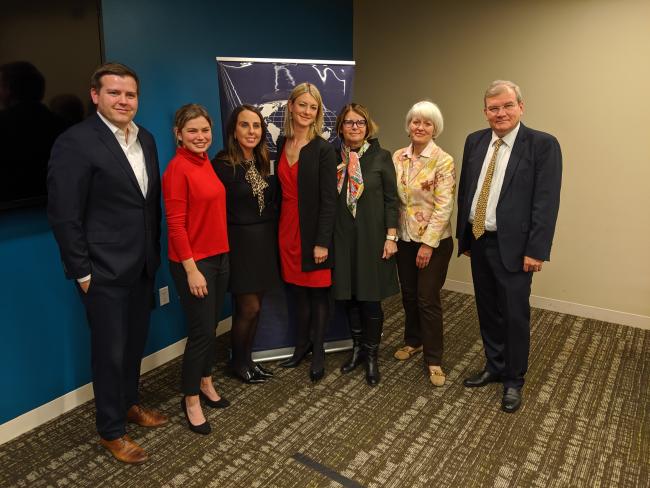In February and April the Embassy of Liechtenstein co-hosted events with Women in International Security (WIIS) to discuss the role gender plays in two areas of great significance, namely counterterrorism and environmental crimes.
For years the Embassy of Liechtenstein has supported WIIS in facilittating a number of roundtable series focused on Gender, Peace and Security to bring together experts and policymakers to advance gender considerations in security policy deliberations.
On February 5, a distinguished panel was brought together for a roundtable titled "A Woman's Place: US Counterterrorism Since 9/11." The panel included Dr. Joana Cook, author of the new book "A Woman's Place: US Counterterrorism Since 9/11," Seamus Hughes, Deputy Director of the George Washington University Program on Extremism, and Lauren Protentis, a communications and national security expert.

Above Picture (from left): Seamus Hughes, WIIS Research Fellow Hannah Proctor, Lauren Protentis, Joana Cook, WIIS President Chantal de Jonge Ourdraat, WIIS Senior Fellow Karin Johnston, and Ambassador Kurt Jaeger of Liechtenstein.
The group highlighted that counterterrorism is an essential topic as various actors assess and understand the many layers and nuances that must be addressed in order to combat violent extremism. This must include an understanding and analysis of how gender informs both terrorism and counterterrorism.
For example, women have always been targets for radicalization, as they can be powerful voices to bring others in from their communities.Grassroots organizations and individuals on the ground, specifically women and those who understand the gender dynamics of countering terrorism, make the most difference in countering violent extremism.
The discussion brought attention to the gap between policy, practice, and academia, resulting in a lack of understanding and action, as well as a lack of support for grassroots efforts. This means that countering violent extremism efforts and counterterrorism initiatives are still not moving forward in legislation at the same pace as they are in academia.
When looking at the current rise in domestic terrorism and alt-right extremist groups, gender dimensions are just as applicable to these groups or individuals as they are to traditional terrorist groups such as ISIS and Al Quaida. However, gender dimensions of terrorism learned over the past 20 years are not necessarily applied to these newer domestic terrorists or alt-right extremists.
The panelists agreed that the future of counterterrorism and countering violent extremism relies heavily on understanding gender dynamics and adapting to growing challenges, and matching those efforts with actual funding from governments. Moving forward, there needs to be a full spectrum and integrated approach on gender and countering violent extremism, and a focus on modernizing resources and research.
On April 22, WIIS and the Embassy of Liechtenstein hosted a webinar titled "Combating Corruption in Environmental Crimes." Panelists included Jessica Graham, President, JG Global Advisory; Lisa Handy, Director of Forest Campaign, Environmental Investigation Agency; Dr. Louise Shelley, Director, George Mason University Terrorism, Transnational Crime and Corruption Center (TraCCC); and Sally Yozell, Senior Fellow and Director, Environmental Security program, Stimson Center. The webinar can be viewed in its entirety here.
The webinar examined how various sectors of the environment (timber, fishing/maritime, electronic/hazardous waste, illicit wildlife trade, etc.) deal with crimes and corruption, as well as the gender dynamics of each sector and the environment overall.
The participants discussed how environmental crimes disproportionately impact local areas, but carry grave global consequences. Corruption is a key contribution to these crimes, and a myriad of other issues, such as sex trafficking and arms deals, come into play with corruption and environmental crimes. Additionally, environmental crimes aren’t getting the same level of attention or focus on finding solutions. Solutions include focusing on local partners, while also integrating women and a gendered perspective. More work with women and groups on the ground should be encouraged to combat corruption, while also targeting consumer environmental laws and making sure they are more widespread, as well as ensuring that enforcement is much better resourced and prioritized.
The group agreed that the gender dynamic of environmental crime is complex, as women do not have much of a role in many of the corrupt activities, such as poaching or deforestation, which tend to be male-dominated. However, when women are engaged they provide a more constructive piece to reducing the vulnerabilities of environmental crimes and corruption. When they are empowered they provide more effective stewardship in their communities.
